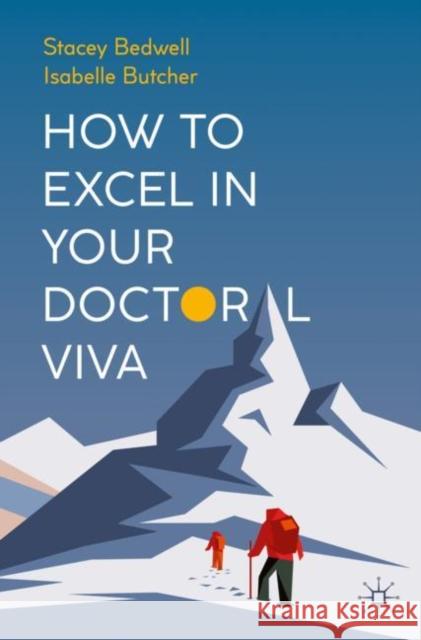How to Excel in Your Doctoral Viva » książka



How to Excel in Your Doctoral Viva
ISBN-13: 9783031101717 / Angielski / Miękka / 2022 / 181 str.
How to Excel in Your Doctoral Viva
ISBN-13: 9783031101717 / Angielski / Miękka / 2022 / 181 str.
(netto: 121,42 VAT: 5%)
Najniższa cena z 30 dni: 127,20 zł
ok. 20 dni roboczych.
Darmowa dostawa!
1 Introduction.
1.1 Welcome.
1.2 The Authors.
1.3 Why Write a Book on how to Complete a Successful Viva?.1.4 How Does this Book Work?.
2 What Is the Viva?.
2.1 What the Viva Is Not.2.2 Purpose of the Viva.
2.3 What Does the Viva Involve?.
2.4 Why Is the Viva an Oral Examination Not a Written Exam?.
2.5 The Viva as a Dyadic Conversation Not an Interview.
2.6 The Viva as an Opportunity to Engage with Academics.
2.7 Practical Points.
Choosing Examiners.
When Do my Examiners Receive my Thesis?.
What Do my Examiners Do Prior to my Viva?.
When Should I Have my Viva?.
Timing of the Viva.
Location of the Viva.
Who Will Be in the Viva Room?.Taking Notes in the Viva.
Communication Etiquette Regarding Viva Examination.
2.8 Post Viva.3 Urban Myths about the PhD Viva.
3.1 Viva Rumours.
3.2 Top.
Urban Myths about the PhD Viva.
3.3 Debunking Common Viva Myths.
4 Real Viva Experiences.
4.1 General Viva Feelings.4.2 Subject-Specific Viva Experiences.
Biosciences.
Animal Behaviour.
Psychology.
Neuroscience.
4.3 Anthropology.
Mathematics.Multidisciplinary.
Medicine.
Nursing.
Theology.
Education.
Pharmacy.
4.4 Examiner Experiences.4.5 Summary.
5 Making the Most of and Enjoying your Viva.
5.1 Making the Most of and Enjoying the Viva.
5.2 An Enjoyable Experience.
The Build-up to the Viva.
The Viva itself.
The Aftermath.
5.3 The Value of the Viva.
A Chance to Show off.
A Chance to Discuss Critically.Gaining Valuable New Perspectives.
Practice in Articulating Complex Ideas.
Practice in Selling you, your Work, and your Skills.5.4 The Purpose of your Viva.
5.5 How the Viva Helps you Post-PhD.
Job Interviews.The Workplace.
Teaching.
Conferences.
Meetings and Presentations.
5.6 Favourite Parts of the Viva.
5.7 Positive Viva Memories.
6 After the Viva.6.1 Outcomes.
6.2 Corrections/Revisions.
6.3 Post Viva Celebrations.
7 Practice Questions.
7.1 Common Viva Questions.
General Questions.
Literature Review/Background Questions.Chapter or Study-Specific Questions.
Overall Contribution and Value Questions.
Alternative Approaches Questions.Future Research Questions.
8 Being Confident in your Thesis.
8.1 How to Ensure you Are Confident in your Work.
8.2 Your Work Is Valuable.
8.4 Imposter Syndrome.
8.5 Defending your Thesis.
8.6 Saying ‘I’ Not ‘we’.
8.7 Honesty and Hindsight.
9 The Viva Preparation Timeline.
9.1 Three Months before Oral Examination.9.2 Two Months Prior to your Viva.
9.3 One Week to Go.
9.4 The Day before.9.5 The Viva Day.
9.6 Preparation Timeline.
10 Participating in a Mock Viva.
10.1 Why Do a Mock Viva?.
10.2 How to Set up a Mock Viva.
10.3 How Far in Advance Should the Mock Viva Be?.
10.4 Who Should Examine the Mock Viva?.
Your Director of Studies/Primary Supervisor.
Other Members of your Supervisory Team.
Faculty Involved in Previous Steps E.G. MPhil.–PhD Transfer/Continuation Viva/Upgrade.
Other Experts.
Non-experts.
10.5 Should Anyone Else Attend your Mock Viva?.
Supervisors.
Audience.
10.6 What to Do after the Mock Viva.10.7 Key Elements and Questions to Include.
11 Viva Concerns.
Dr. Isabelle Butcher was awarded her PhD in Psychology in 2021 from the University of Manchester, UK, for her work on the negative symptoms of schizophrenia and traumatic life events. Isabelle’s current research interests are in the area of adolescent mental health and the impact of traumatic life events. Isabelle also has a keen interest in the ethics of research and is currently chair of an NHS ethics research committee.
How to excel in your doctoral viva offers an accessible guide to approaching and preparing for a PhD viva examination. The book explains what the viva is, how the process works, and what the purpose of the viva is. It guides the reader through the course of preparing for their viva examination, with chapters focusing on organisation to dealing with viva concerns. Contributions from over 25 academics ranging from critical care to theology provide a unique insight into the experiences of PhD candidates and examiners, and make this book an invaluable resource for students completing PhDs across the sciences.
Dr. Isabelle Butcher was awarded her PhD in Psychology in 2021 from the University of Manchester, UK, for her work on the negative symptoms of schizophrenia and traumatic life events. Isabelle’s current research interests are in the area of adolescent mental health and the impact of traumatic life events. Isabelle also has a keen interest in the ethics of research and is currently chair of an NHS ethics research committee.
1997-2024 DolnySlask.com Agencja Internetowa
KrainaKsiazek.PL - Księgarnia Internetowa









